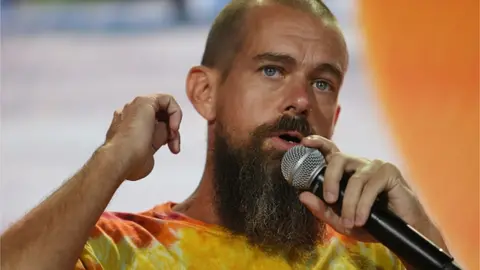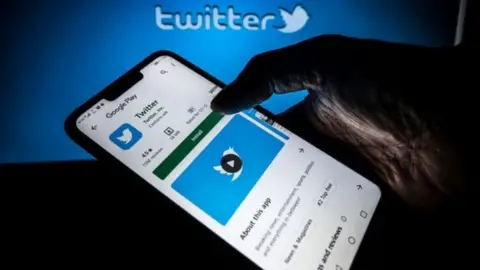Jack Dorsey: India threatened to shut Twitter and raid employees
 Getty Images
Getty ImagesFormer Twitter CEO Jack Dorsey has alleged that the Indian government threatened to shut the platform and raid employees' houses in the country.
In an interview with a US-based YouTube channel, Mr Dorsey said India requested removal of several tweets and accounts linked to the farmers' protest in 2020.
Twitter was also asked to censor journalists critical of the government, he alleged.
India has denied the allegations and accused Twitter of violating laws.
"This is an outright lie... Perhaps an attempt to brush out that very dubious period of Twitter's history," federal minister Rajeev Chandrashekar tweeted on Tuesday.
"No one went to jail nor was Twitter 'shutdown'. Dorsey's Twitter regime had a problem accepting the sovereignty of Indian law. It behaved as if the laws of India did not apply to it."
Mr Dorsey's comments - made to the American news series Breaking Points - are the latest in an already troubled relationship between Prime Minister Narendra Modi's Bharatiya Janata Party (BJP) government and Twitter.
It also comes at a time when the platform has been caught up in an intensifying debate on its role in supporting principles of free speech amid demands in several countries to control Twittter's influence.
Mr Dorsey quit as the Twitter CEO in 2021 and the social media platform was purchased by billionaire Elon Musk in 2022.
In the interview, which was uploaded on YouTube on Monday, Mr Dorsey said "countries like India and Turkey made many requests to us to take down journalists' accounts that give tactile information and remove them from the platform".
He added that he was "surprised at the level of engagement and requests" by governments of the world to censor content on the platform during his time.
"India, for example, was a country that had many requests around the farmers' protests, around particular journalists that were critical of the government," he said.
"It manifested in ways such as: 'we will shut Twitter down in India' - which is a very large market for us; 'we will raid the homes of your employees,' which they did; 'we will shut down your offices if you don't follow suit.' And this is India, a democratic country," Mr Dorsey told the show's hosts Krystal Ball and Saagar Enjeti.
 Getty Images
Getty ImagesAt the height of the farmers' protests against a series of agriculture reform laws, the government had asked Twitter to remove tweets it believed that had used an incendiary hashtag, and accounts it alleged were used by Pakistan-backed Sikh separatist groups.
The request came after the largely peaceful protest had been jolted by violence on 26 January 2021, which left one person dead and hundreds of policemen injured.
Twitter had first blocked some 250 accounts, including those of a news magazine and activists and organisations associated with supporting the year-long protests on the outskirts of capital Delhi.
But six hours later, Twitter restored the accounts, citing "insufficient justification" for continuing the suspension.
The Indian government immediately ordered Twitter to block the accounts again and told the company's employees in India that legal action would be taken - which could be up to seven years in prison - if they did not comply.
Twitter responded, saying it would not block accounts belonging to media companies, journalists, activists and politicians because that would "violate their fundamental right to free expression under the Indian law".
Relations between Twitter and Mr Modi's government have been downhill ever since.
Critics say that at the heart of this is a new internet law that puts social media platforms like Twitter and Facebook under the direct supervision of the government. The government says the rules are meant to tackle misinformation and hate speech, but experts worry it would lead to censorship.
Mr Musk, who succeeded Mr Dorsey, said in April that "rules in India for what can appear on social media are quite strict".
In Monday's interview, Mr Dorsey compared India's actions to those by governments in Turkey and Nigeria, which have briefly restricted the platform in the past.
"Turkey is very similar [to India], we had so many requests from Turkey. We fought Turkey in their courts and often won, but they threatened to shut us down constantly," he said.
"Nigeria is another example... The situation was such that we could not even put our employees on the ground in the country out of fear of what the government might do to them."
